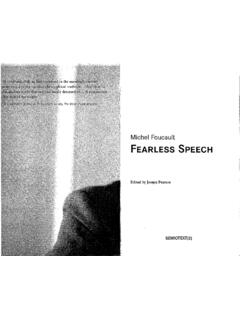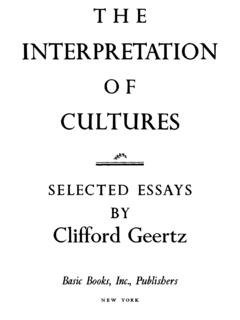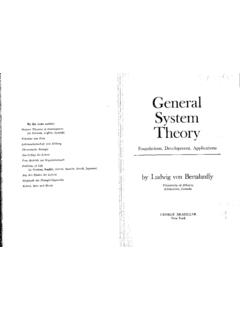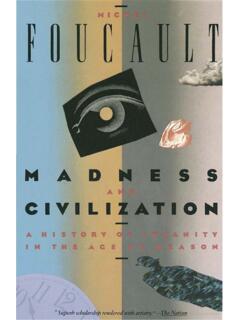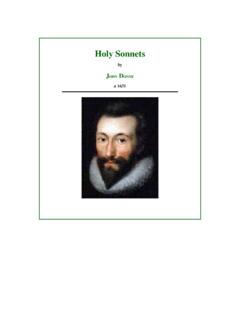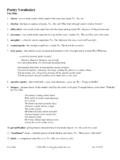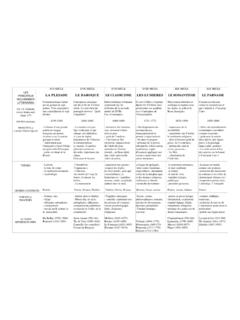Transcription of LETTERS TO A YOUNG POET HAIN ER MARIA RILKE
1 LETTERS TO A. YOUNG POET. HAIN ER MARIA RILKE . TRANSLATION BY HERTER NORTON '. PT. I 2635..165. Z54. 1962. N E W C i-IL ' - C :j ~ o r n s a SO til' _ . ? i ' . LT. S A N F R A N C IS C O , C A L IF O R N IA 0 4 1 0 2. (4 i 5 ) 6 2 5 - 4 2 I Z. R ilk e was bom in Prague in 1875 , the son of a conventional army-officer father and a religious-fanatical mother, who first sent him, most unsuitably, to military school. After that, largely autodidact, he studied philosophy, history, literature, art, in Prague, Munich, Berlin.
2 From his earliest years he wrote verse. In the '90s both Erste and Fr he Gedichte appeared, short stories, plays. Much of his early work he declined to include in his col . lected works. In 1899 (which saw the Cornet, first version). came the first of two trips to Russia with Lou Andreas-Salome (Vom lieben Gott und Anderes, later to be called Geschichten vom Lieben Gott, appeared in December 1900 ). He married Clara Westhoff in 19 0 1 , lived in Worpswede till the birth of their only child, Ruth, moving to Paris in 1902 , Clara to work with Rodin, RILKE to write his monograph on him.
3 Between travels in Ger . many, France, Italy, Spain, Egypt, Scandinavia, and his prodigious letter -writing, the twelve years with Pans as base were produc . tive: Stundenbuch, Buch der Bilder, Neue Gedichte, Notebooks of M. L. Brigge, translations of E. B. Browning, Gide, de Guerin. After the outbreak of World War I he lived mostly in Munich, served briefly in army office work in Vienna, and in 19 x9 went to Switzerland. Here, in the small stone tower of Muzot, he achieved in 1922 the Duineser Elegien and the Sonette an Orpheus, fol.
4 Lowed by poems in French and translations of Valery and others. He died at Valmont near Glion on December 29, 1926 , and is buried beside the little church of Raron overlooking the Rhone Valley. RAINER MARIA RILKE . In Translations by M. D. H erter N o rto n LETTERS to a YOUNG Poet sonnets to Orpheus Wartime LETTERS of Rainer MARIA R il\e Translations from the Poetry of Rainer MARIA Rilf^e The Lay of //.. Love and Death of Cornet Christopher Rilfye The Notebooks of Malte Laurids Brigge Stories of God Translated b y S t e p h e n S p e n d e r and J.
5 B. L e is h m a n Duino Elegies Translated by J a n e B a n n a r d G r e e n e and M. D . H erter N o rto n LETTERS of Rainer MARIA R il{e Volume One, 1892-1910 Volume Tw o, 1910-1926. LETTERS . TO A Y O U N G. POET. GRsaincr Jviaria ^Rjlkc T R A N S L A T I O N BY M. D. H E R T E R N O R T O N. REVISED EDITION. oooooooooooooooooooooooooo '^ ^ 3/ <>$> <>>00000. Hew York W W NORTON & COMPANY INC . COPYRIGHT 1934 BY W . W . NORTON & COM PANY, INC. RENEW ED 1962 BY M . D. HERTER NORTON. REVISED EDITION COPYRIGHT 1954 BY.}
6 W . W . NORTON & COM PANY, INC. ISBN 0 393 00158 X. P R IN T E D IN THE U N IT E D STATES OF A M E R IC A. 0. Contents TRANSLATOR'S N O TE 7. IN TRO D U CTIO N 9. THE LETTERS 15. C H RO N IC LE, 1903-1908 79. 5. Translators J\[ote How these LETTERS came to be written is told by their recipient in his introduction, and to this there would be nothing to add were it not for the close of the eighth letter : Do not believe that he who seeks to comfort you lives untroubled among the simple and quiet words that sometimes do you good.]
7 His life has much difficulty and sadness.. Were it otherwise he would never have been able to find those words. It is evident that a great artist, whatever the immediate conditions disturb . ing his own life, may be able to clarify for the benefit of another those fundamental truths the conviction of which lies too deep in his conscious . ness to be reached by external agitations. Though RILKE expresses himself with a wisdom and a kind . ness that seem to reflect the calm of self-possession, his spirit may have been speaking out of its own need rather than from the security of ends achieved, so that his words indeed reflect desire rather than fulfillment.
8 In what sort this was the 7. case becomes apparent on perusal of the several volumes of his correspondence. From these, for the most part, the accompanying chronicle of the years 1903-1908 has been prepared. It shows what RILKE was going through in his own relationship to life and work at the period in question (he turned twenty-eight in December, 1903). Perhaps such a record may in a measure explain, too, why sympathy was always so responsive an element of his nature. Certainly despite low physical vitality that often reduced him to actual ill-health, despite lack of funds and homeless wandering in search of the right places and circumstances for his work, despite all the subjective fret and hindrance be.
9 Cause of which some think to see in him a mor . bidly conditioned fantasy the legend of the weary poet is dispelled, and in the end we find him always YOUNG , always constructive, the emi . nently positive philosopher of these LETTERS . New York, October, 1934. In revising the text for the present edition the translator is indebted to Herbert Steiner for many helpful criticisms and suggestions. Washington, , February, 1954. Introduction Introduction It w asin the late autumn of 1902 I was sitting under some ancient chestnuts in the park of the Military Academy in Wiener-Neustadt, reading.
10 So deeply was I absorbed in my book, I scarcely noticed when the only civilian among our profes . sors, the Academy's learned and kindly Parson Horacek, came to join me. He took the volume from my hand, contemplated the cover, and shook his head. Poems of Rainer MARIA RILKE ?' he asked reflectively. He then turned the pages here and there, skimmed a couple of verses, gazed thought . fully into the distance, and finally nodded. So our pupil Ren RILKE has become a poet. - And I learned of the thin, pale boy, whom his parents had sent more than fifteen years ago to the Lower Military School at Sankt-P lten so that he might later become an officer.



